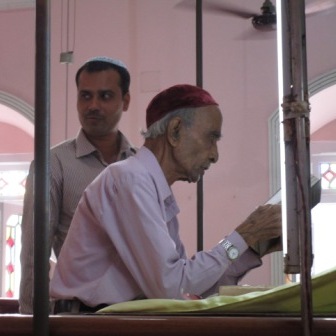
Banner

India’s Jewish community: Not going down without a fight
DAN BROTMAN
Pictured Hazzan reciting a prayer for Elijah the Prophet, at the Magen Aboth Synagogue in Alibag. The synagogue is kept open for the village’s remaining three Jewish families.
The purpose of the trip was to spend a week learning about and engaging with the Indian Jewish community, which today numbers just 4 350 out of a country of 1,2 billion.
The Indian Jewish community was at its largest (around 30 000 members) around the time when India declared independence and the State of Israel was founded. The vast majority of the community emigrated to Israel, North America, the UK and Australia over the next two decades, leaving behind a small fraction of the community who decided to remain.
The Malabari were the first Jews to settle in India over 2 000 years ago and are descended from the seven families who arrived in Kerala following the destruction of the First Temple.
The next Jews to arrive were the Pardesi, who were refugees fleeing the Inquisition in Spain and Portugal.
The Bene Israel, who are the majority of the community, arrived 900 years ago, but lost most of their Jewish traditions and assimilated into Indian life, remembering only the Shema Yisrael prayer and basic kashrut. They were brought back to traditional Judaism in the 1700s after coming into contact with Cochin’s established Jewish community, and were fully recognised as Jews by the Israeli Rabbinate in 1964.
The final Jews to arrive were the Baghdadis, who migrated from Iraq in the 1800s for commercial reasons. The illustrious and fabulously wealthy David Sassoon and his descendants belong to this last group of migrants, and the Sassoon dynasty has left an indelible mark on Mumbai’s cultural and historic landmarks.
On Friday night our group attended services at Mumbai’s Knesset Eliyahoo Synagogue, which was built in 1885 by David Sassoon’s son, Jacob Elias. The synagogue was built during the height of the British Raj and it was easy for me to conjure up an image of wealthy Baghdadi traders dressed in linen suits filling its pews at the turn of the 20th century.
The 30 of us praying in its sanctuary consisted of elderly local Jews, Chabad rabbis and a sprinkle of Western tourists. Services were followed by Shabbat dinner at the Chabad House, which today resembles a fortress following the 2008 terrorist attack that killed its rabbi and rebbetzen. In addition to post-army Israeli backpackers and Western tourists at dinne, were a number of Indian-born Jews living abroad on a roots trip with their children and grandchildren.
While the Indian Jewish community is in decline due to emigration and diminishing demographics, I left sensing that despite all the odds against them, this small community will not go down without a fight. I was very impressed with the “cradle to grave” services the community offers, similar to our own, ranging from Jewish schools (albeit with few Jewish slearners), meals on wheels, old aged homes and youth group activities.
We spent our final day of the trip at Bayiti, Mumbai’s only Jewish old aged home. The majority of the residents either have no children to care for them, were tragically duped out of their savings (sometimes by relatives) and were thus unable to look after themselves, or have children who emigrated and who do not provide for their parents.
Prior to the establishment of Bayiti, some of its elderly Jewish residents were homeless or sleeping under stairwells.
Our visit to Bayiti coincided with Republic Day, a national holiday commemorating when India’s constitution came into force. We celebrated this national holiday with Bayiti’s residents by singing our respective national anthems. Following renditions of Jana Gana Mana, The Star-Spangled Banner and God Save the Queen, as the only “South African” member of the delegation, I volunteered to sing a solo rendition of Nkosi Sikelel’ iAfrika.
As I did, I could not help but feel sad that such an ancient Jewish community is doing everything in its power to carry on, but realistically may no longer exist in my lifetime.
A former resident of Cape Town, Dan is the executive director of the South Africa-Israel Forum and is based in Johannesburg. For more on JDC Entwine, visit www.jdcentwine.org.





Denis Solomons
February 16, 2015 at 10:26 am
‘India is the most densely populated area of the world and will soon overtake China as being the most populous nation of the world .
So we definitely need India on our side .
A bit of curry powder in the keneidelach never did anyone any harm .
A shul in the Taj Mahal and in Mombai would be a good thing .
Saris are allowed at shul(s) ? !’
Miriam Abraham
April 9, 2016 at 12:00 pm
‘My dear Aunt has recently been accepted by and has moved into Bayiti after her home of 40 years was reclaimed by the landlord and my Aunt was ‘thrown’ out on to the street. I am very thankful that Bayiti exists so that she could have a roof over her head. ‘